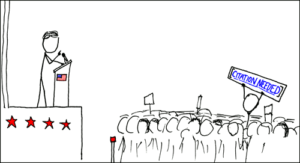 Some days i get horribly distracted by arguments on social media. It’s a trap. It’s especially frustrating when your opponents seem to make Absolutely No Sense, when their arguments are spurious, based on misinformation, or deliberately goading.
Some days i get horribly distracted by arguments on social media. It’s a trap. It’s especially frustrating when your opponents seem to make Absolutely No Sense, when their arguments are spurious, based on misinformation, or deliberately goading.
But then sometimes it helps me to sort through my own thinking. For example, when ABC news posted the first video from the No campaign, a guy called “Phil A” said that Julia Gillard had voted no on SSM, and they would vote no “Just like gillard (sic) did.”
You might be tempted to think he’s posted that to deliberately goad all the Yes campaigners who loved Julia but were frustrated by her refusal to shift on this issue. You might note that in fact Gillard never actually voted on the issue, that she was expressing her personal position which has since changed. Whatever.
The 100+ replies included a series of attempts to reason with this guy, to understand where he was coming from, and presumably to persuade him to think differently. The discussion was heated, but a lot of the comments started with questions. A few people let their frustration get the better of them, and called him names. What interested me was the point where Phil A said, “All you have to do is post a comment saying you’re voting no and the bigots bombard your comment with insult after insult.”
So i reflected on this exchange, and thought there are definitely some worthwhile points to be learned here:
1) “We’re (not) being silenced!”
The No Campaign is using this idea as a central strategy, claiming that they are being silenced by political correctness. They claim that “bigot” is an insult, and that it’s not fair to call someone a bigot. (And yet, Phil A of the conversation lumped his opponents together under that label. Whoops.)
Seems to me that in fact, their opinions are getting a huge amount of airplay right now, especially given that the normal rules of political advertising don’t apply during this postal survey. This goes back to Howard’s era of blaming the cultural elites, suggesting that minorities are running the world now, that they’ve all become the media gatekeepers.
It seems ridiculous to me, to suggest there’s a case of “bullying-by-the-minority” going on… but how to counter that perception?
2) What is a bigot, exactly?
..and is it really an insult? I was interested to look up the word “bigot”, and i think maybe opposing campaigns have a different understanding of the word. I wonder if this is having an impact on the conversation:
3) Actual insults?
Looking through the replies to Phil A’s original comment, i found 3 actual *insults* from people opposing Phil, out of 135 comments. Not really a bombardment though, Phil (imo).
Pretty much all the other comments were in the form of questions, trying to work out how this Phil guy could hold such a view, hoping against hope that they could change his perspective somehow. That’s definitely not insulting. In fact, that’s high praise, that all these people thought Phil was human enough to connect with, that they all felt it could be worth wrestling with his world view, to try and understand better. That even though he was of the opposing viewpoint, he was worth their time and engagement.
 4) How to stop ourselves responding with name-calling?
4) How to stop ourselves responding with name-calling?
i do agree, that responding with “you’re a bigot (tool, simpleton, troll etc)” is not helpful (although it may make you feel better in the short term).
But I do not agree that either left or right can be called “more abusive”.. all of us have this tendency when feeling frustrated (and stupid, baseless arguments can be very frustrating).
So, great work everyone, let’s all remember to keep the focus on the argument not the person, if you want to win.
Even when a person has said something that seems outrageously prejudiced and ignorant, we could say, “Your comment seems loaded with prejudice”, rather than “You’re a few eskies short of the full picnic, aren’t you.”
Okay, i’m aware that my thoughts could be read as “tone–policing” – which on reflection is exactly what the No Campaign is doing, by claiming that “The Left” is an Abusive and Bullying Hegemony from Hell . Please, by all means, if you’re angry, respond with fury. If you feel the urge to call someone names, go right ahead, do as you wish.
References: how to argue more effectively online
Here’s a couple of good reference article on how to engage in argument on social media:
————–
images:
- “Wikipedian protester” by Randall Munroe aka XKCD, CC-BY.
- Sunset view from the back of the Seljalandsfoss waterfall in Iceland by Diego Delso, CC-BY-SA (wikimedia)